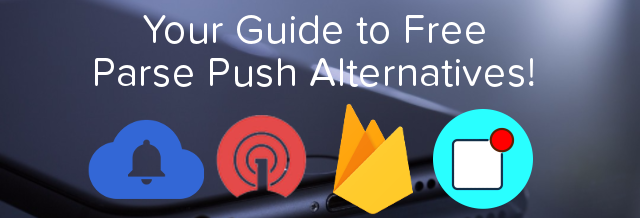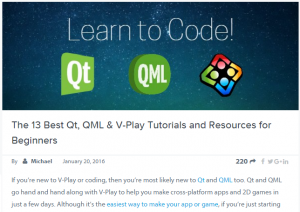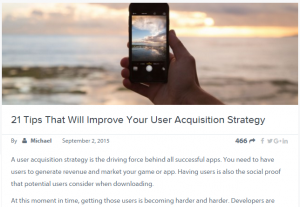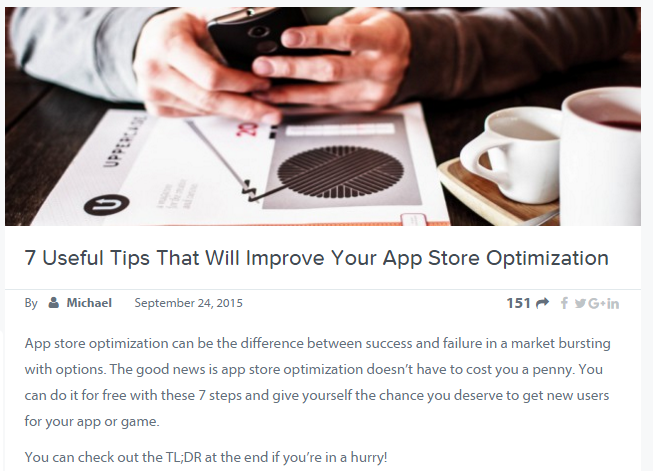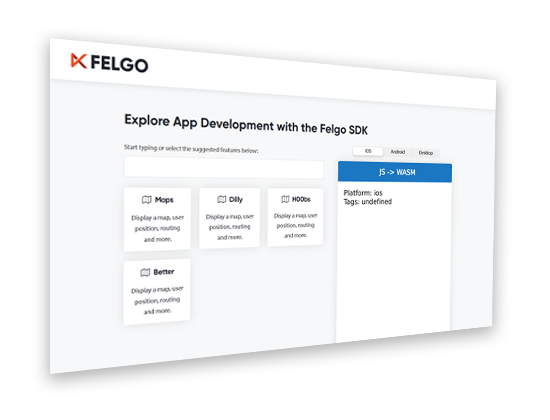Since Facebook announced the end of Parse, we’ve been looking at the best alternatives for sending push notifications.
Push notifications are an essential tool for engaging and retaining users. Developers can use them to send their users reminders, let them know about recent updates or ask for reviews and feedback. Using a reliable service for push notifications helps if you want your app or game to have active users.
Until now, Parse has been one of the best suppliers of this service. Unfortunately, it ends, in it’s current form, after January 2017. It’s becoming an open-source project and won’t offer all the same services as it used to.
Since this news broke in January 2016, a number of alternatives to Parse have grown in popularity. We’ll take a look at what these services have to offer and how they compare to the original Parse Push notification service!
Plus, find out how to integrate a push notification service into your Felgo App or Game with a simple code snippet!
Requirements – Alternatives to Parse
We had four main requirements in mind when looking into Parse alternatives:

Free Usage Plan
The new service should provide a free usage plan so developers can try it out for themselves and see how to get started. Signing up for a service without the ability to test their push notification features in a real world scenario is a serious roadblock for most developers.
Similar Feature Set
The new plugin should provide the same feature set we already offer with our Parse plugin. We still want the ability to send push notifications on a transactional basis to single devices, all devices of a user, or a group of users. This is an essential feature that must be supported. The concept of channels, used within the Parse plugin, is an optimal design pattern that we want in any potential replacement.
Easy Migration
We were looking for a scenario where transitioning from one push provider to another would only take a few seconds. The best case would see you as a Parse Plugin user making only one change to your code, simply changing your item’s name to see the new service properly set up.
Cross-Platform Performance
Like Parse, a new plugin should handle the platform-specific differences between iOS and Android transparently, both in the app or game code, and from the back end side.
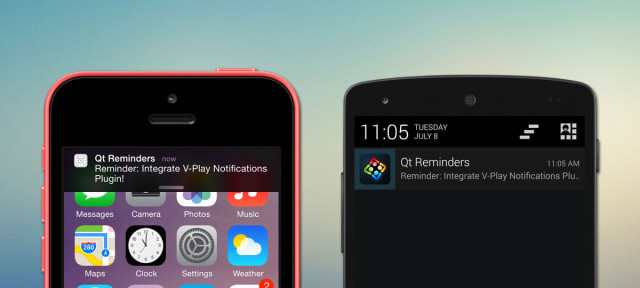
Ideally, sending pushes from your server shouldn’t get out of control when sending different requests for iOS and Android, and dealing with sockets or customized payloads. We wanted to stick with a simple HTTP request, sending a JSON body, and the rest being handled by the push plugin when possible.
We also kept in mind that we’d probably want to have the option of supporting push notifications on new platforms in the future. So services that already provided push notification support for Windows Phone 10, Ubuntu Phone or desktop notifications earned extra points.
Available Services for Sending Push Notifications
Based on these requirements, we had a closer look at alternatives to the Parse Push service. We’ve ranked the services too, with the best Parse alternatives for Felgo developers getting extra points. These were the services that made it onto our final shortlist:
- Google Cloud Messaging (GCM)
- OneSignal
- Batch
- Urban Airship
- Amazon SNS
- Firebase (FCM)
- Accengage
- Catapush
- Quickblox
- Boxcar
- Parse – Open Source
- Backendless
- Sashido
- Syncano
- Teradata
- Kumulos
- Carnival
- Streethawk
- Pushwoosh
- Kinvey
- Conclusion
Google Cloud Messaging (GCM)
Google Cloud Messaging (GCM) soon became our favorite for a feature-complete Parse substitution for Felgo developers. Google provides an abstracted push service for both iOS and Android, using Push only is free, and Google’s topics can be created from your app without any additional server-side code.

OneSignal
As we started implementing GCM, we also had another look at alternatives for the Felgo Game Network. We wanted to find a way of sending and receiving push notifications for game invites, user chats or friend requests. Based on this simple feature set, we had a look into OneSignal.

OneSignal also provides server-side localization of push notifications, maintaining the different device languages in their own database and allowing you to update your push texts without releasing a new app update. You can send a localized push notification for three languages from your back end, just like this curl request demo:
curl --include \
--request POST \
--header "Content-Type: application/json" \
--header "Authorization: Basic <API-Key>" \
--data-binary '{
"app_id": "<App-ID>",
"contents": {
"en": "New friend request",
"de": "Neue Freundschaftsanfrage",
"es": "Solicitud de nuevo amigo",
"fr": "Demande d’ajout"
}
}' \
https://onesignal.com/api/v1/notificationsDepending on the device language, only the set language will be sent to the device and shown in the push.
Tags can be aggregated and it’s also possible to use different operators. So if you tag your users with a region identifier and their current user level in your RPG game, you can send a push to users who are currently checked in at middle-earth and have a level greater than 10, with a tag combination of:
[
{"key": "region", "relation": "=", "value": "middle-earth"},
{"key": "level", "relation": ">","value": "10"}
]
OneSignal service is free for all push notifications and provides a lot of features. These are covered in our documentation.
Batch
While there are many great services out there, a lot of them missed our basic requirements for app and game push notifications. Some of the services lack a free plan for transactional push notifications, although they are reasonably priced for their rich feature set, such as Batch.

Urban Airship
Urban Airship does a great job at handling marketing and campaigns. They automatically segment users based on events triggered from within your app, something it has in common with Batch.

Amazon SNS
Amazon SNS looked great when we first considered it. There’s a free plan, transactional push notifications and Amazon provides a similar concept to Parse’s channels, called topics. Unfortunately, it’s not possible to create new topics on-the-fly. You have to create topics from your server-side code first, making things a lot more complicated for your back end.
For example, sending pushes to all devices of a user, identified by a userId, is easy with Parse:
Parse {
channels: [ "userId" ]
}
When trying to do this with Amazon SNS, you first have to explicitly create this channel/topic (“userId”) from the back end. It’s not possible to create topics on-the-fly.
And there’s another restriction on Amazon SNS: You can only create up to 10.000 topics per app. While this might seem like more than enough, if you create a sports news app that sends out push notifications for a range of sports, it’s not possible for all your users to get a unique channel. Instead, you would have to manage tokens and users in your own database back end.
Note: Amazon released an even newer push notification service just as this article was being written. You can check out Amazon Pinpoint here.
Firebase (FCM)
Firebase was acquired by Google in 2014 but it was only this year that they started to support push notifications. It also added advertising through AdMob integration and analytics for mobile developers.

Accengage
Accengage offers a range of Push services for mobile developers, from CRM connections to Push Geomarketing.
Catapush
This service is dedicated specifically to sending push notifications and is priced depending on how many active users you have. Their free tier allows you to engage with up to 100 monthly active users.

Quickblox
While QuickBlox isn’t an all-in-one service, it does offer separate SDKs for sending push notifications with iOS and Android. And their free plan lets you send 20 notifications per second, as long as you have less than 20,000 users.
We can’t attest to how easy it is to send these notifications or what customizable options are available. But their free plan definitely offers value for developers working within a restricted budget.
Boxcar
Boxcar calls itself the “Universal Push Notification Platform” and is another service worth checking out for those with a smaller budget. It offers cross-platform support for iOS and Android and let’s free users send 200 Pushes Per Minute.

Parse – Open Source
For a couple of months now, the Parse open-source server has been supporting the sending of push notifications. However, there are important features missing like sending queues, so it’s not really production-ready as of now.
Backendless
Backendless offers a fully-functioning mobile-backend-as-a-service to developers. This service includes the ability to send push notifications from client or server and has cross-platform capabilities.

Sashido
If your main concern when finding a Parse alternative is avoiding downtime during migration, then Sashido is a strong choice. They offer to migrate your services with zero downtime.

Syncano
Syncano offers the ability to send push notifications to Android and iOS users. This is possible from a dashboard that was designed with ease-of-use in mind. Syncano is a customizable tool with the ability to add sockets to your app.
TeraData
TeraData, or Appoxee as it was once known, offers their own complete tool for sending push notifications. TeraData offers a campaign builder, personalization options and a dashboard for tracking the success of push notifications to iOS and Android devices.
Kumulos
Although Kumulos is mainly aimed at app marketing agencies, it may have some use to you as a developer. It offers cross-platform push notifications for Android and iOS and user segmentation features.

Carnival
Not only does Carnival offer push notifications, it provides a range of rich messaging services. These allow you to customize your push notifications with images and videos. The service also includes the ability to send in-app notifications and deep-link messages that bring your user to a different part of your app.

Streethawk
Pushwoosh
This service offers the ability to send push notifications to up to 500,000 devices free. It has support for Android, iOS and 19 other platforms.
If you’re interested in more than sending push notifications, things can get pricey quickly with this service. Their first paid license starts at $50/month, although it’s stacked with features.
Kinvey
Kinvey offers enterprise-level solutions for a number of business, but you can’t forget it’s MBaas too. Along with Push Notifications, it offers data storage, location tracking and more. If you have a large project in mind, it may be worth getting in touch with Kinvey to see what kind of a deal they can do for you.
While there’s no free trial to speak of, you may be interested to sign-up and take their free tutorial to see if you’re interested in what they have to offer.
Parse Alternatives for Felgo
You can add push notifications to your Felgo App or Game in just a couple of minutes. Here’s a quick code example to show you how easy it is to add OneSignal push notifications to Felgo:
import QtQuick 2.0
import Felgo 3.0
OneSignal {
appId: "<add-your-app-id-here>"
onNotificationReceived: {
console.debug("Received notification with message:", message)
}
}
For further information on how to integrate the OneSignal Plugin with your Felgo app or game, see our documentation.
To summarize, we decided to go with two plugins for now: Our new OneSignal plugin, which features an easy setup and simple, targeted push notifications. And the new Google Cloud Messaging plugin that supports advanced use cases like client-side localized push notifications and invisible background downloads, as already provided by our Parse plugin.
You can access Felgo Plugins for monetization, analytics and more with the Felgo Indie License. To test the plugins for yourself, download our Qt Plugin Demo App from the App Store and Google Play.
For the full source code of this sample app, including all Felgo Plugins, you can check out this GitHub sample.
More Posts like This
16 Great Sites Featuring Free Game Graphics for Developers
The 13 Best Qt, QML & Felgo Tutorials and Resources for Beginners
21 Tips That Will Improve Your User Acquisition Strategy
7 Useful Tips That Will Improve Your App Store Optimization

